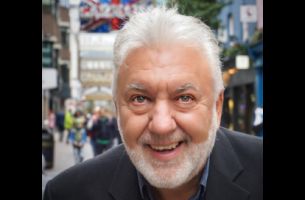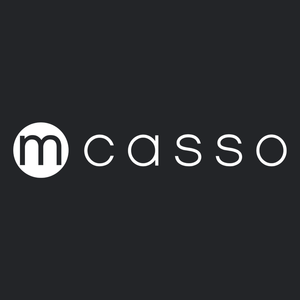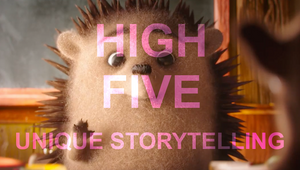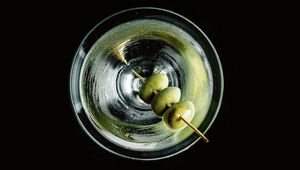
5 Minutes with… Mike Connaris

‘5 minutes with Mike Connaris’ was always going to turn into ‘5 hours with’. One of the friendliest people working in the ad industry, he has plenty of stories to share too. He got a song to the Eurovision finals TWICE. He’s written songs for his beloved Chelsea Football Club. And if you were a child in the UK in the early 1990s, you will probably know the lyrics to his Milky Way ad by heart. He often gets mistaken for Donald Sutherland. Lots of ground to cover.
The co-founder and CEO of music company Mcasso has been in the advertising industry for almost 40 years and he still gets a thrill every time he sees a spot that he or his team have composed for on TV. His enthusiasm is infectious and you can’t help but be drawn in. He loves music and he loves people.
LBB’s Laura Swinton caught up with Mike for a big ol’ chat!
LBB> You set up Mcasso with your bandmates – how did you go from being in a band together to running a business?
MC> I used to play in this band and we travelled a lot, toured different countries, playing on American bases, RAF camps, doing weddings and parties, everything.
We set up a tiny recording studio in the tiny, smelly cellar below my dad’s hairdressers’ in Battersea Park Road. We put an advert in NME and Melody Maker to say we would record people’s demos for them. We had some interesting people come in, like the lead singer of Kajagoogoo - before he was famous. We didn’t see him again until he was in the charts!
The studio and production company needed a name and my mum – bless her – said, ‘why don’t you use your initials?’ She put them together and came up with Mcasso.
LBB> So how did Mcasso end up going from a studio in a cellar to a Soho institution?
MC> We were the backing band for a guy called Scott Fitzgerald. One day he came to our little studio and asked if I wanted become a recording engineer in a studio in Soho called Sounds Aquarian. I had never engineered anything, but the guys said that it might mean that we could use studio time there for ourselves now and again.
It was a proper recording studio with half inch tape and a huge deck and massive microphones. I thought, ‘how am I going to tell them I can do this?’ I told them if they left me there for the weekend with my band, I’d try to get to grips with it. They gave me the keys and on Saturday I had to figure it all out. The first job came in about lunch time on Monday – for a band called the Tremeloes.
I worked there for a couple of years and worked with all the top ‘jingle companies’. Companies like Joe & Co and David Dundas, who had a hit record with his first commercial, Jeans On for Brutus Jeans. There was Ronnie Bond, who did the ‘crumbliest chocolate’ Flake ads and the Coco-Pops jingle.
I was the engineer for all these top companies and I saw how they all worked. They all worked differently but they all were totally professional. Then, Terry Fry, a producer who was using Kingly Studios next door, asked if I might be able to compose something. I got the band in and wrote this little song and it was great. We started to get some music on air. I was doing this all in my spare time because I was doing 12 hours as an engineer.
Then we put together a show reel and we managed to get some work. We moved from Sounds Aquarian to Lexington Street – the first Mcasso office. I think our first proper ad was for Renault London, a radio ad that ran for 25 years: ‘No one knows Renault Like Us’.
LBB> Our of your older projects that I have to ask you about is the Milky Way ad from the late 80s, the one about the red car and the blue word… I know it word for word!
MC> You’re joking?
LBB> No!
MC> I wrote that! Anyone between the ages of four and 12 in the UK when it came out knew that one. On Facebook alone it has had 5 million views. We also did a Christmas Single too and I still reckon today that if Milky Way wanted to have a chat and revisit it, we could have a hit.
LBB> So who did you work with on it?
MC> The creatives were these two guys called Roger Rex and Roger Sealy. They came up with the words and they trusted us with the music. They didn’t go round the houses to three or four music companies asking for demos. They’d come to us and asked us to come up with three ideas.
Feedback was so great, so they approached Mars and said that they wanted to do a single. We got a record deal so easily with Virgin. We didn’t get a single play on the radio because it was commercial; BBC and Capital wouldn’t touch it. But that didn’t matter, Mars said they’d advertise it. So at the end of the commercial they added ‘Christmas Single out now’. How wonderful to have clients like that! It got in the charts!
It wasn’t just a campaign that would run for two weeks, it’s something they stuck with for three or four years. It was a brave thing in the beginning but it paid off so well. It was a real fantastic way of working with a smart creative team.
LBB> So our football loving-readers will probably be interested to know that you wrote a couple of big songs for Chelsea. Blue Day, which was sung by Suggs in 1997, and Blue Tomorrow in 2000. How did that come about?
MC> Ever since I was tiny, my Dad took me to Chelsea, so I’ve always been a big Chelsea fan. Between 1972 and 1997 they hadn’t won anything - I had been going as a season ticket holder through the ups and downs. Ken Bates bought the club in the 80s for £1 because they were in such debt. He brought Glenn Hoddle in to be manager, and because of his name it enabled Chelsea to bring in these ‘nearly finished’ players. People like Ruud Gullit, Gianluca Vialli, Gianfranco Zola. They turned Chelsea round and we suddenly got to the semi-final of the FA Cup.
It was a time when people did Cup Final songs, so I thought I’d try and come up with something. We won the semi-final on the Sunday and I sent it to three record labels on the Monday. Within two hours I had heard back from two record companies.
One of them was Warner. They had already recorded a Chelsea song… but they liked mine better! They wanted Suggs to sing it. The next day, the Tuesday, he came down to our studio. I went with him for some beers and we were out to the early hours, talking about Chelsea. He knows Soho like the back of his hand. It was fantastic. After that he asked me to co-write with him because he was going to do his solo album, so I co-wrote some songs on that and it was really good fun.
LBB> So when Chelsea got to the final that year, what was it like to hear the fans singing your song?
MC> It was a year after England released a song with the Lightning Seeds and the comedians Skinner and Baddiel, called Three Lions. I remember sitting at home watching it on the telly and everyone singing it and I could see the camera on Skinner and Baddiel had tears in their eyes. Little did I know a year later we’d be in exactly the same position!
When they played the song, Blue Day, our side was jumping up and down singing it and they all knew the words. It had only been released a week before that. I got goose bumps!
Two years later we got to the cup final again and a record company asked me to do another one, and I wrote Blue Tomorrow. As a song I prefer it, and it got to the same position in the charts as Blue Day but everyone tends to remember Blue Day as that’s the first time we had success.
LBB> So aside from Chelsea, another big passion of yours is the Eurovision Song Contest. How did that happen?
MC> I first got involved in Eurovision when the UK was really trying to get success again. We hadn’t been successful since Katrina and the Waves' ‘Love Shine a Light’. We got two songs in the last eight in the UK competition and we actually went onto Top of the Pops with these two acts… but we didn’t win.
The following year, through a friend of a friend, we met this girl called Alberta who was cheeky and had a very original voice. The drummer of our band was a good writer and we wrote this song called ‘Don’t it Make You Feel So Good’. It got to the last four… and we came second to represent the UK. But we got interest from BMG and a guy – I don’t know if you’ve heard of him – called Simon Cowell called us up to his office! He asked us if we could write some more for him. We wrote this song called ‘Yoyo Boy’. It was a catchy song and it charted but unfortunately it didn’t make Christmas number one.
After we wrote another song for Alberta and entered again into Eurovision, a song called So Strange. It was a sort of ska song. It was really catchy, and she sang in English and in French. Again we got in the top four… and again we came in second! By then I was really getting the bug for it.
I tried it again and I was with these identical twins from Roehampton and they sounded amazing. You couldn’t tell the difference between them when they sang. We came 4th to Katrina and the Waves, who won it.
LBB> Wow, so you got close so many times! But I hear you found a bit more success writing for Cyprus?
MC> In 2004 someone told me they had changed the rule for Cyprus. My Dad was Greek Cypriot and they said if you had Greek Cypriot nationality through a family connection they were opening up to writers from abroad.
LBB> So where do you start with a Eurovision song?
MC> The answer to that, for me, is with the singer. You don’t write the song and try to find a singer. You find the artist and then you tailor the song for them, so it suits them and is in the right key and everything.
I’d heard about this girl, Lisa Andreas, through people I knew at London Greek Radio. She came over with her two managers, a man and a woman, and we went round to a place called Gallery Rendevouz in Beak Street. They had Karaoke rooms downstairs and she sang ‘I Will Always Love You’. And, I tell you, by the end I had tears in my eyes.
We did a song for her called Stronger Every Minute. It’s a song we had written a few years before as an up tempo song but we turned it into a ballad. We went to Cyprus and she won and got into the finals!
LBB> Oh brilliant. What was that experience like?
MC> What people do not understand about Eurovision is how massive it is in Europe. The UK looks on it with that tongue in cheek attitude, but I’ve never seen such a posse of cameras and journalists to meet this young girl. The people looking after us in Turkey were unbelievable, they treated us like kings and queens. We finished 5th in the end, which is the highest position Cyprus had ever reached!
Since then I’ve tried it quite a few more times with different singers with no luck until last year, I heard they were doing this new style of competition in Cyprus, like the X-Factor. So they were going to let everyone who wanted to enter a song on there. I’ve got a contact in Limassol and he recommended a young 19-year-old guy called John Karayiannis. We put the song in the competition in Cyprus and we won it and we went to the finals in Austria last year.
LBB> So do you have any more Eurovision ambitions?
MC> This year I had two things on my bucket list. One was to score 180 at darts, and a month ago I did that. And my other thing is to win Eurovision!
LBB> So - onto advertising! When you get a brief in, what’s that process like?
MC> We’ll follow the brief but what we’ll also do is we’ll sit back and look at the film as if we hadn’t got a brief at all to see what we think. It used to be that we’d get agencies saying ‘we’ve got this film but we don’t know what to do with it’. That’s what our skill is.
With the Internet it’s so easy to go on YouTube and find a well-known track and match it up to the picture. What we’re trying to do is bring agencies along to the studio and when we get creatives in there they absolutely love it. They can be part of the process. What Tom, our MD, is trying to do is bring people down and get them to trust us as a company and to talk to us at a really early stage.
It hasn’t happened often, but on one occasion we saw the film and turned round to the agency and said, ‘in our honest opinion, we don’t think this needs music. However if you want us to have a go we will do some demos’. In the end the ad went out without music. That’s doing ourselves out of work, but you have to be honest. They’re your clients.
LBB> And I know you’ve got some frustrations about the overuse of famous tracks in ads…
MC> Sometimes you see an ad that’s got a voiceover going through the whole thing and there’s a well-known track in the background that’s clashing with the voice over and is totally lost. You think, ‘you’ve persuaded the client to fork out 50-100 grand for this track!’
The slight problem you have is that the editor normally wants to cut to a track and what can happen is that the client gets used to, say, a Coldplay track. And then the producer calls up the publisher and it’s £500,000… and she gulps because she really knew it was going to be something like that.
We’ll get the dreaded call saying ‘we can’t afford the track but we want something in that style’. Legally, we can’t go anywhere near it. We have to use our expertise to create a track that’s creating a similar feel but does not resemble the track they wanted in any way. Even if they hadn’t contacted the publisher you have to be careful.
Sometimes they’ve managed to persuade the client to fork out the money for the track… and you think… was it worth the money? There are occasions where I would argue it is worth the money, but there are many more times when it wasn’t. Had they really thought about it from the beginning, they could have worked with a company to compose something tailor-made.
LBB> I’d love to ask you about the Kellogg’s ad where you worked with two Zulu choirs – that sounds like an amazing experience!
MC> That was a wonderful opportunity. There were two choirs – we found one in London and one from Leeds. We had to get the Leeds one down because the agency loved what the London one had done with the harmonies but wanted to try something a little different for the lead lines. So we found this Leeds Zulu group and it was incredible.
They came down on the Saturday and this one guy had this amazing vibrato voice. After the session they sang us a song that they had written, called ‘We Are Proud’. Tom, our MD, and I looked at each other and said…’we’re going back into the studio’. We recorded it in 20 minutes and it was fantastic. If we ever got the opportunity to use that song we would. It’s their song, and I would definitely work something but working with other musicians who are talented people is brilliant.
LBB> So what projects have you worked on recently that you’ve really enjoyed?
MC> There’s a 90-second ad for Guide Dogs that’s going to go on national TV. Some of it was shot in our studio, so our studio will be on TV! One of the guys featured in the ad came up with his guide dog because he’s a musician. Dave spent two or three hours with him. Dave played some parts that we’d done and he copied them, so his performance is on the ad. It’s a real weepy one because there are real people who are saying that they don’t know how they managed before these animals came into their life. It’s so touching.
We’ve done Breast Cancer, the funny one for Seed animation, which is a really funny film about different ways of saying ‘boobs’. Very cleverly written, again, the message is simple: whatever you call ‘em, check ‘em.
We did another charity spot recently for Scope too. It’s nice. You want to do it because you want to be part of it and it’s us putting something back. Sometimes there’s no budget at all, but if they are clients that we work with it’s nice to get involved.
LBB> When it comes to young talent, do you get a lot of interest from young people just out of college or university who are looking to get into the business?
MC> We have a lot of inquiries. Perhaps between ten and 15, every week . They’ve obviously seen Mcasso’s history and think they’d like to reach out. We make a point of listening to everything and getting back to them. There are a lot of talented people out there but the attitude, I think, is very important too.
Recently we had a guy who called in and we thought he was pretty good. We had a brief come in so I thought I’d test him out. I didn’t mention money, but our intention was always to pay him – but he went into it without even asking. We want people to be able to see the opportunity in something because that’s the way we are with our clients. He did something and it was quite good. I don’t think he got the job, one of our other guys did, but the client really liked the track. So now, we will give him other opportunities and one day one will go through.
LBB> You also do a lot of composing for TV, especially kids TV. Does that differ a lot from advertising?
MC> Sometimes you get the opportunity to write the lyrics, or they’ll give you an outline of what they want and you’ve just got to come up with something really, really catchy. The biggest thing we did for kids’ TV is a BBC programme called The Lampies. The theme song was really popular and we had to go on all these kids’ shows with Alan Smith (the AS of Mcasso). It was so funny because everyone knew the song!
It was voted the Best Children's Song in an International Songwriting Competition, which we just entered for a laugh. But we won it and it was amazing! We won a guitar and we won a supply of guitar strings for the next five years, which was amazing. We still use them today!
LBB> So, you’ve done all those amazing things in your musical career… but what do you think you’d be doing if you weren’t doing this?
MC> I’m lucky enough to have taken the risk. I was working for Lambeth council when I left school. I had one proper job for a year. I was actually good at maths, it’s the one A Level I got and I got three promotions in one year. I was moving up very fast and I remember the Borough Treasurer saying, ‘Blimey, the rate you’re going you’ll have my job soon!’
The following week our agent called our band up and told us they had a three month residency in Switzerland near Gstaad. It meant we all had to give up our jobs. We eventually decided to do it and our parents backed us, but our bass player didn’t want to. We had a week to find a bass player and that was Alan Smith. He was a guitarist, not a bass player. He had a week to rehearse some songs and we learned seven with him, and by the time we came back we knew 70 songs! I could have been Borough Treasurer today, how about that?
Anyone who has a hobby that turns into a career is lucky. I think I would have carried on with music even if I had a 9-to-5 local government job but to be able to turn it into a business that’s been going so long, I’m really proud of it. I remember the first day, having our first little office, having that first phone call come in, seeing something on TV. The kick I still get from seeing something on air – and it doesn’t have to be something I’ve done, something that someone in the company has done!










